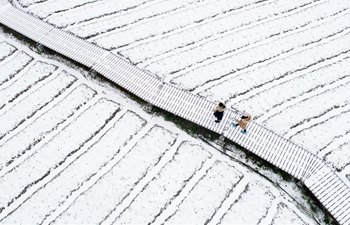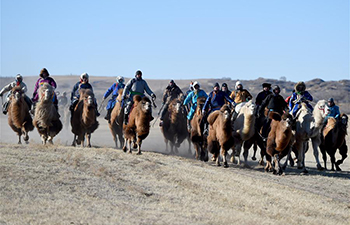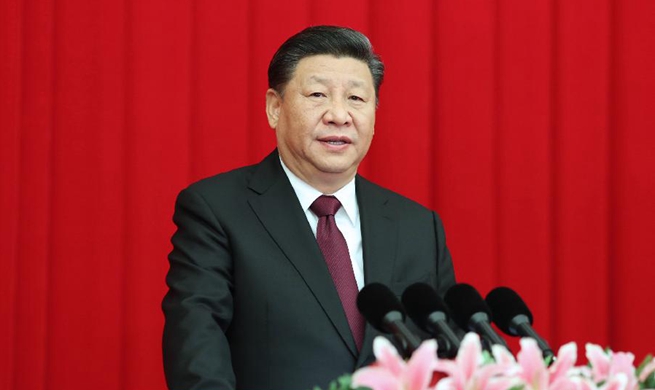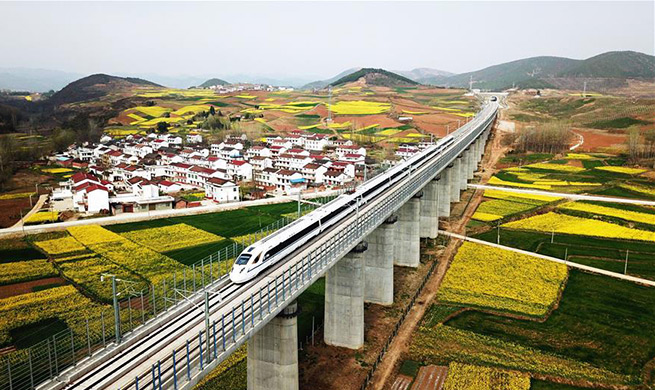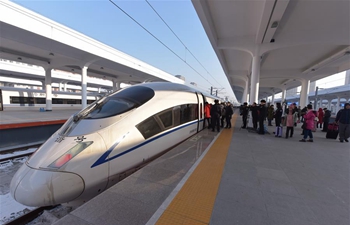YINCHUAN, Dec. 30 (Xinhua) -- Longwangba, literally meaning flatland for God of Rain, carries the most sincere yearning of the generations of people living in the mountains in China's dry northwest.
Located in Xiji County of Guyuan City in northwest China's Ningxia Hui Autonomous Region, Longwangba Village was once part of the most impoverished area.
Guyuan, along with five other counties, is called Xihaigu, one of the world's most uninhabitable places due to its dry climate, high mountains and harsh environment.
Jiao Jianpeng, 37, was the youngest of seven children in a farmer's family, and he grew up in Longwangba. His childhood memory of destitution is still fresh.
"We lived in a house made of bare earth, and I had to support myself through college by selling tea-flavored eggs," he said.
In 1997, Jiao was admitted to the Ningxia College of Finance and Economics. He was one of the very few college students in his village.
Now, with a dedication to developing his hometown, sharp vision for commerce and support from the government, Jiao represents a new generation of poverty reduction champions across China's vast countryside, transforming the landscape of economic backwaters and breathing life into the once barren land.
"Business has been quite good this year and we have seen a lot of tourists, campers and trainees. The village used to only be this crowded during the Spring Festival when migrant workers came home. Rural tourism is bringing life to the village," said Jiao.
After Jiao graduated from college in 2001, he entered into the advertising business and operated Internet salons. By 2011, he had earned enough money to be able to make a change in his hometown.
"I had 4 million yuan and thought I might use the money to achieve something, but I did not expect agriculture investment could be so huge," he said.
In 2011, he rented 80 hectares of forest land to build chicken farms, echoing a national call to develop the forest economy. In 2013, he rented another 133 hectares to grow peonies and strawberry.
"I'm so glad that the investment helped improve the environment of the village," he said.
In 2014, the village was given the award of being one of the most beautiful villages in China by the Ministry of Agriculture.
However, the honor did not stop Jiao from pursuing his ambitions further. "There is no brand effect, and our farm products do not fetch high prices," he said.
Jiao anticipated the next growth point to be rural tourism, banking on the growing popularity of rural lifestyles and natural beauty among urban holidaymakers.
He hired workers to build a cave-style hotel to offer guest houses along terraced fields.
"Rural tourism is about getting everyone in the village involved and offering to outsiders something that is genuinely small-town," he said.
Li Jing, 27, a receptionist at the cave hotel, takes home about 2,500 yuan each month. She used to work in the capital city of Yinchuan and Beijing as well.
"Working near home is much better," said the mother of a four-year-old child. "I can take care of my child every day. The hotel provides accommodation, too."
Now 404 families live in Longwangba. More than 200 people in the village work in the tourism sector. About 20 families own rural guest houses, each earning over 20,000 yuan every year.
In 2017, more than 130,000 travelers visited the village, and the annual per capita revenue rose to 9,200 yuan (about 1,333 U.S. dollars).
"People used to try their best to escape from here. Now with the improved infrastructure, they are coming back," said Jiao Bingnan, a homestay hotel owner, pointing to an array of newly decorated hotels with independent bathrooms.
Jiao has succeeded in daredevil entrepreneurship, and he is not hesitant to support young people who have dreams.
"Those who could come up with viable tourism programs or business proposals will get my support in office space, training and investment," he said.
Now the village offers a great variety of recreational services such as coffee bars, pubs, 5D experience facilities and escape rooms.
"The rural rejuvenation is about keeping the young people in the villages and giving them a reason to stay and make a living here," he said.
Jiao is married and has an eight-year-old daughter. When he does not need to go on business tours, he spends most of his time in the village.
"The pride and satisfaction I get from being able to create value for my fellow villagers and my hometown are immeasurable," he said.




